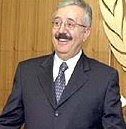 The WaPo has a very interesting piece by a former CIA spook branch employee talking about the problems with human assets in the intelligence game. Recall that during the Clinton years our intelligence agencies began putting more emphasis on electronic means and less on the "HUMINT" side in an effort to clean up our clandestine act.
The WaPo has a very interesting piece by a former CIA spook branch employee talking about the problems with human assets in the intelligence game. Recall that during the Clinton years our intelligence agencies began putting more emphasis on electronic means and less on the "HUMINT" side in an effort to clean up our clandestine act. As an illustration Mr. Weisberg, our expert, decided to use the case of Naji Sabri, the CIA's star-studded mole leading up to the Iraq war (whom Tenet in part based his slam dunk comment):
If Sabri was being controlled by Iraqi intelligence as a double, the most likely goal of such an operation would have been to convince the U.S. government that Iraq did not have weapons of mass destruction. This means that Sabri's "intelligence" would have been the same whether he was a double or not -- Iraq had no WMD. So the only way to figure out if it was real intelligence or disinformation would have been to determine with absolute certainty whether Sabri was a double.Not to tell this man his business (such a phrase usually indicates the writer is about to do exactly that) but by most accounts Sabri didn't say Iraq had no WMDs. Instead, he mentioned stockpiles of chemical weapons and claimed Saddam wanted to reconstitute his nukes but downplayed the biggest fears of UN inspectors--the bio weapons. He also apparently told CIA that Saddam was an expert in fooling inspectors.
Therefore, based on Mr. Weisberg's logic it might seem that when Sabri told the CIA Iraq did have some proscribed weapons left it would have come across as highly convincing, since nobody expected Saddam to be intentionally bluffing about having WMDs with several American military divisions breathing down his neck. Weisberg continued:
In Sabri's case, his overriding concern probably would have been securing CIA protection in the event of a U.S. invasion. This could have led him to tell the entire truth about everything he knew. But it could just as easily have led him to tell us what he thought we wanted to hear.So, he either lied or he didn't? Well, OK. More than a few noticed Sabri was not included in the 55 deck of cards after the invasion, quite odd considering his position in the regime. Today he lives in the open as a teacher in one of the Emirates, so for all the world it appears the US honored the deal.
Perhaps Sabri figured Bush was coming no matter what he said, so he talked of the 500 buried shells knowing that's what everyone wanted to hear, and knowing it would get him a better deal. He didn't go overboard, which made him appear more credible both before and after the invasion. But it's an erroneous conventional wisdom to say he told CIA there was nothing, one the WaPo apparently doesn't mind propagating as we move towards decision 08.
The ironic thing is Sabri could have also been telling CIA exactly what Saddam wanted them to hear since later debriefings suggested the Butcher wanted to maintain the WMD facade as long as he could, thinking Bush was bluffing. Perhaps then the question worth asking is whether CIA told Sabri we were coming to induce his cooperation, and whether Sabri then told Saddam, and if so why Saddam didn't believe us. The end was certainly filled with a lot of called bluffs, eh?

No comments:
Post a Comment